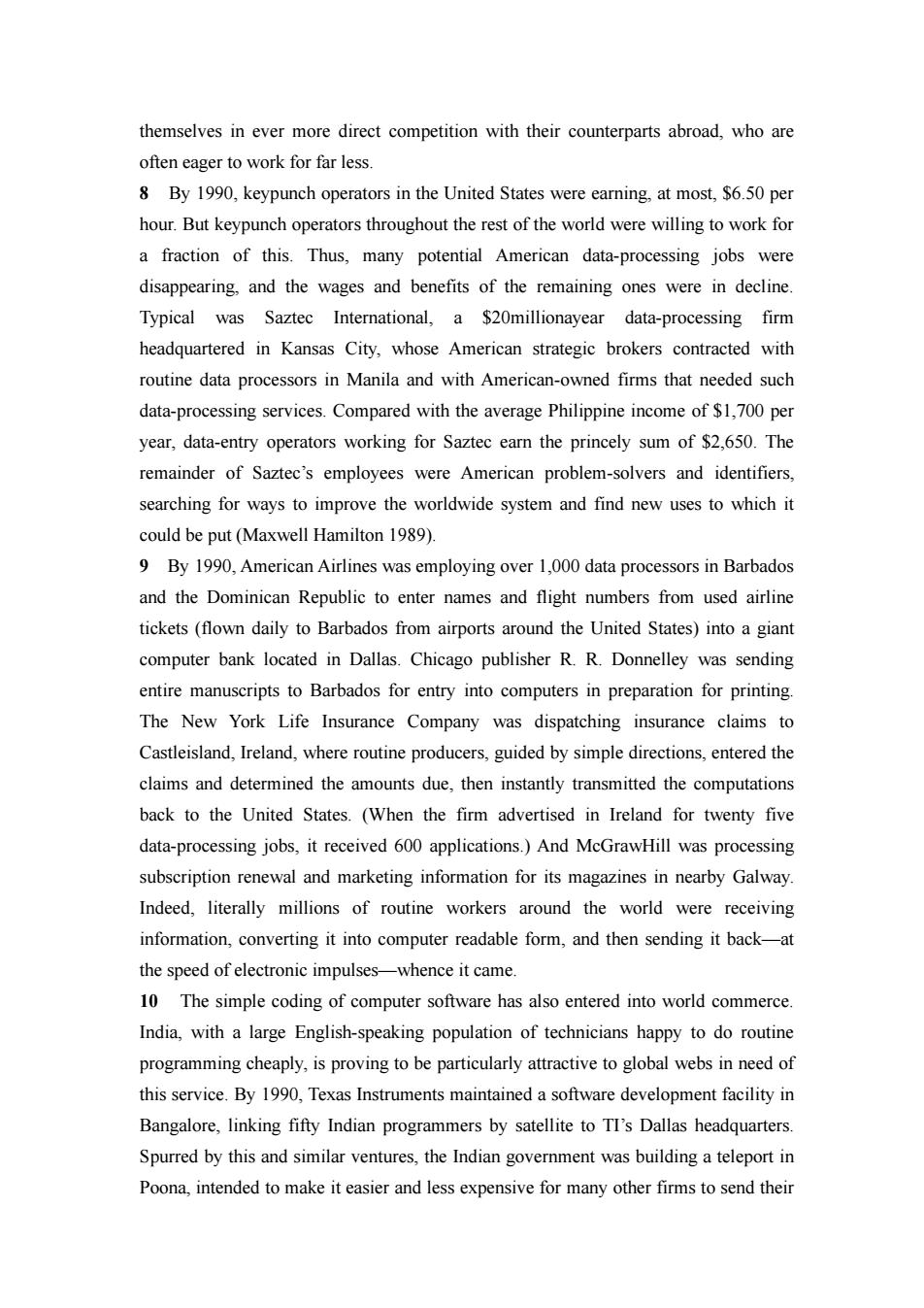正在加载图片...

themselves in ever more direct competition with their counterparts abroad,who are often eager to work for far less. 8 By 1990,keypunch operators in the United States were earning,at most,$6.50 per hour.But keypunch operators throughout the rest of the world were willing to work for a fraction of this.Thus,many potential American data-processing jobs were disappearing,and the wages and benefits of the remaining ones were in decline. Typical was Saztec International,a $20millionayear data-processing firm headquartered in Kansas City,whose American strategic brokers contracted with routine data processors in Manila and with American-owned firms that needed such data-processing services.Compared with the average Philippine income of $1,700 per year,data-entry operators working for Saztec earn the princely sum of $2,650.The remainder of Saztec's employees were American problem-solvers and identifiers, searching for ways to improve the worldwide system and find new uses to which it could be put(Maxwell Hamilton 1989) 9 By 1990,American Airlines was employing over 1,000 data processors in Barbados and the Dominican Republic to enter names and flight numbers from used airline tickets(flown daily to Barbados from airports around the United States)into a giant computer bank located in Dallas.Chicago publisher R.R.Donnelley was sending entire manuscripts to Barbados for entry into computers in preparation for printing. The New York Life Insurance Company was dispatching insurance claims to Castleisland,Ireland,where routine producers,guided by simple directions,entered the claims and determined the amounts due,then instantly transmitted the computations back to the United States.(When the firm advertised in Ireland for twenty five data-processing jobs,it received 600 applications.)And McGrawHill was processing subscription renewal and marketing information for its magazines in nearby Galway. Indeed,literally millions of routine workers around the world were receiving information,converting it into computer readable form,and then sending it back-at the speed of electronic impulses-whence it came. 10 The simple coding of computer software has also entered into world commerce. India,with a large English-speaking population of technicians happy to do routine programming cheaply,is proving to be particularly attractive to global webs in need of this service.By 1990,Texas Instruments maintained a software development facility in Bangalore,linking fifty Indian programmers by satellite to TI's Dallas headquarters. Spurred by this and similar ventures,the Indian government was building a teleport in Poona,intended to make it easier and less expensive for many other firms to send theirthemselves in ever more direct competition with their counterparts abroad, who are often eager to work for far less. 8 By 1990, keypunch operators in the United States were earning, at most, $6.50 per hour. But keypunch operators throughout the rest of the world were willing to work for a fraction of this. Thus, many potential American data-processing jobs were disappearing, and the wages and benefits of the remaining ones were in decline. Typical was Saztec International, a $20millionayear data-processing firm headquartered in Kansas City, whose American strategic brokers contracted with routine data processors in Manila and with American-owned firms that needed such data-processing services. Compared with the average Philippine income of $1,700 per year, data-entry operators working for Saztec earn the princely sum of $2,650. The remainder of Saztec’s employees were American problem-solvers and identifiers, searching for ways to improve the worldwide system and find new uses to which it could be put (Maxwell Hamilton 1989). 9 By 1990, American Airlines was employing over 1,000 data processors in Barbados and the Dominican Republic to enter names and flight numbers from used airline tickets (flown daily to Barbados from airports around the United States) into a giant computer bank located in Dallas. Chicago publisher R. R. Donnelley was sending entire manuscripts to Barbados for entry into computers in preparation for printing. The New York Life Insurance Company was dispatching insurance claims to Castleisland, Ireland, where routine producers, guided by simple directions, entered the claims and determined the amounts due, then instantly transmitted the computations back to the United States. (When the firm advertised in Ireland for twenty five data-processing jobs, it received 600 applications.) And McGrawHill was processing subscription renewal and marketing information for its magazines in nearby Galway. Indeed, literally millions of routine workers around the world were receiving information, converting it into computer readable form, and then sending it back—at the speed of electronic impulses—whence it came. 10 The simple coding of computer software has also entered into world commerce. India, with a large English-speaking population of technicians happy to do routine programming cheaply, is proving to be particularly attractive to global webs in need of this service. By 1990, Texas Instruments maintained a software development facility in Bangalore, linking fifty Indian programmers by satellite to TI’s Dallas headquarters. Spurred by this and similar ventures, the Indian government was building a teleport in Poona, intended to make it easier and less expensive for many other firms to send their